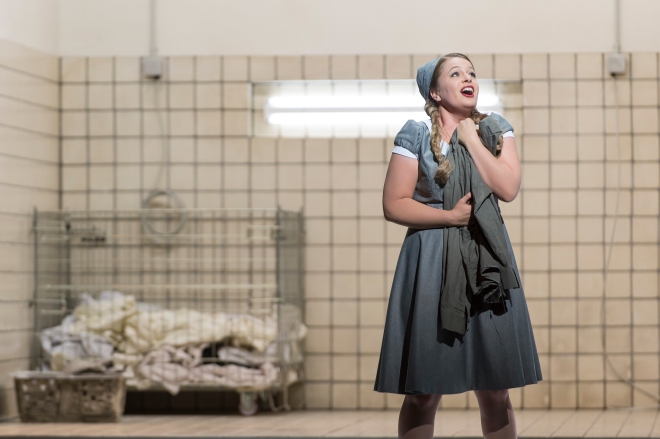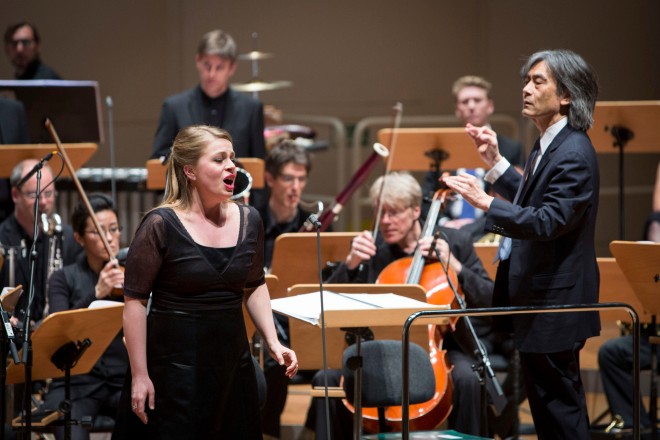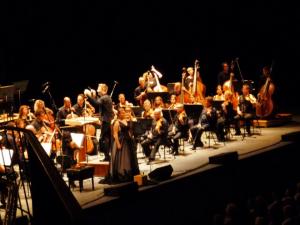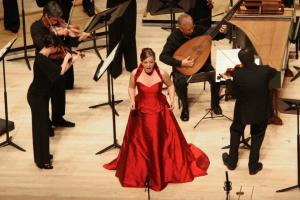For Susanna in Le Nozze di Figaro, Royal Opera House Covent Garden July 2023:
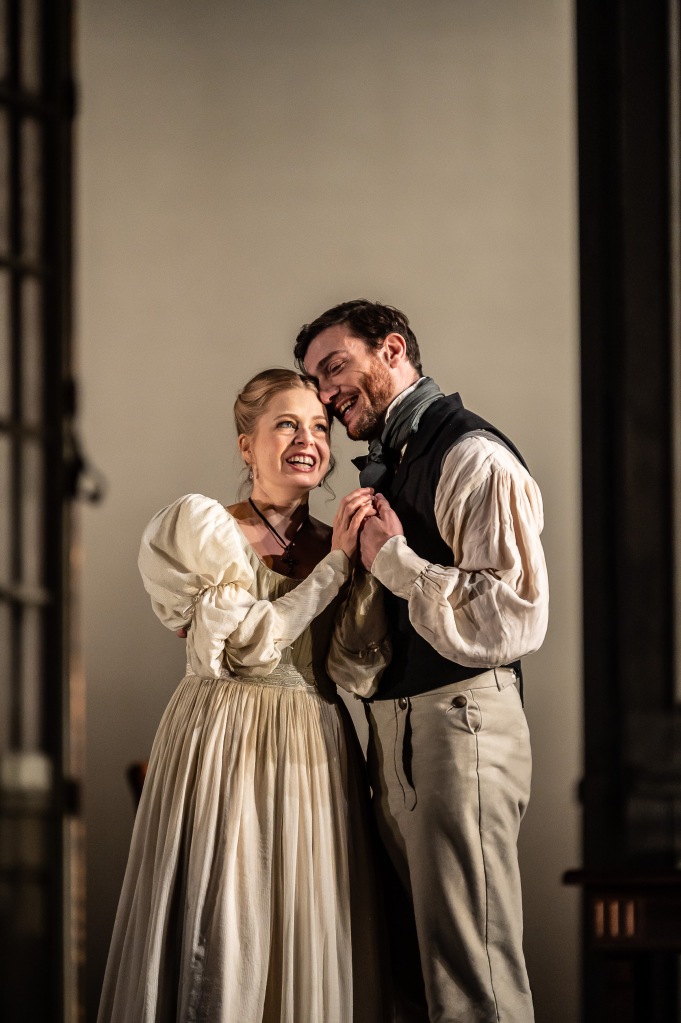
“The plot centres on the coming nuptials of Susanna (superbly played by Australian soprano Siobhan Stagg) and Figaro…” Hartston William, Express.
“In her role debut as the Countess’s maid, Susanna, the Australian soprano Siobhan Stagg brings youthful vivacity and lively phrasing” Geoff Brown, The Times
“Siobhan Stagg phrased eloquently as Susanna… she rose to the challenge of ‘Deh vieni’ in the final act, making it the emotional crux of the performance.” Keith McDonnell, Music OMH
“Siobhan Stagg was a youthful bright Susanna…” Andrew Lohmann, London Unattached.
For Violetta in LA TRAVIATA at Northern Ireland Opera in Belfast, UK:

“In her first Violetta, Siobhan Stagg has a lightness of voice, sinewy and focused in the coloratura, every note hitting the gleaming centre, without strain or error. This Australian soprano based in Germany may have to act frail and consumptive, but she is resilient and musically indestructible.” Fiona Maddocks, The Guardian.
“Siobhan Stagg triumphs in Northern Ireland Opera’s excellent staging of La Traviata: Australian soprano Sobhan Stagg was superb in the role of Violetta. When she first appeared hosting a lavish party at the start of Act I and was the embodiment of social sophistication. As the production went on, we saw more and more of Violetta’s rich humanity with all its flaws, and the progressive frailty of the character. Stagg excelled in Verdi’s vocal fireworks and coloratura in Act I. ‘Sempre libera’ coursed along with infectious joy while the coquettish ornamentation in ‘Un di, felice, eterea’ was a delight. Stagg produced considerable vocal power and blazing top notes when required. In the final act her rendition of ‘Addio, del passato’ was heartbreaking and, as she finally took her leave, I doubt if there was a dry eye left in the house… The evening belonged to Siobhan Stagg who was deservedly greeted with ecstatic applause at the end of the evening.” Robert Beattie, Seen and Heard International.
“Australian soprano Siobhan Stagg was an outstanding Violetta, intoxicating us with the pearly beauty of her voice and convincing us with her excellent acting as seductive courtesan, rejected lover and consumptive tragic heroine. There are very few moments when Violetta is not on stage, and so Stagg captured our attention and devotion right from the get go and held it to the very end. At times coquettish, at other times exquisitely intimate, Stagg spun the gossamer thread of her melody effortlessly throughout. She dispatched the virtuosic melisma passages in “Sempre libera”, her final aria of Act 1, with ease while her impassioned reconciliation with Alfredo at the end of Act 3 was heart-rending.” Andrew Larkin, Bachtrack.
“Violetta expires in an ecstasy of emotion, more dramatically than, say Mimi in La Bohème. And Siobhan Stagg, whose beautiful voice gave us terrific accounts of the super-emotional arias, rose to the challenge… Stagg was tremulous, full of delicate enjoyment and overcome when her beau to be, Alfredo, joins her and creates a duet. It was memorable.” Jane Hardy, Irish News.
“Stagg was vocally secure and convincing in conveying the brittle nature of the consumptive heroine… (and) looked splendid in a crimson ball gown set against the monochrome Parisian party scene.” Cathy Desmond, Irish Examiner.

Siobhan Stagg shines as Violetta: “In the hands of the acclaimed operatic soprano Siobhan Stagg, Violetta’s character is certainly done justice. From airy courtesan to fevered invalid, Stagg nails every turn of Violetta’s heel. Needless to say, Stagg’s voice is like something out of a dream. As smooth as silk, and yet still able to cut through the orchestra, her grace on stage is pretty much unmatchable. The ease with which she traverses arias, makes Giuseppe Verdi’s most demanding phrases look downright easy. Stagg shines brightest when showcasing Violetta’s compassion and kindness, making her untimely death all the more painful.” Tacita Quinn, London Unattached.
“Stagg’s Violetta is sweet, light, and beguiling, her flowing coloratura immaculate, with an inner toughness gently emerging in the final scene. It is a voice that seems to hark back to older interpretations of this role.” Michael Lee, Golden Plec.
“The star of the show, however, is Siobhan Stagg who seems to breeze through her technically challenging parts with élan. Her great emotional range brings necessary depth to Violetta’s tortured soul…” Ian Patterson, Theatre News.
Violetta is beautiful, haughty and wealthy, as underlined by Australian soprano Siobhan Stagg’s grand entrance. She sweeps on stage, resplendent in a revealing scarlet taffeta ballgown. Stagg is an extraordinary singer, as dazzling in the coloratura of Act I as in the steely drama of her pivotal Act II encounter with Alfredo’s disapproving father Germont (a suitably aged Yuriy Yurchuk) and the shining purity of her death scene. Her mastery of Piave’s flowing libretto is faultless, particularly in the duet combining her creamy voice with Yurchuk’s rich baritone.” Jane Coyle, The Stage (UK)
For Mahler’s Fourth Symphony with Francois Xavier Roth and Gürzenich Orchester Köln, August 2023:
“Das finale ‘Himmlische Leben’ sang Sopranistin Siobhan Stagg engelsgleich vom Balkon über dem Orchester, erdete das Transzendenzverlangen aber zugleich mit den besungenen handfesten Gaumenfreuden…. Gefolgt von begeistertem Applaus.” Rainer Nonnenmann, Kölner Stadt-Anzeiger
Translation: “The finale was sung angelically by soprano Siobhan Stagg from the balcony above the orchestra, grounding at the same time the desire for transcendence with tangible vocal delicacies... Followed by enthusiastic applause.”
“Im vierten Satz sang Sopranistin Siobhan Stagg … Mit hell leuchtender Stimme klang ihr Vortrag wie eine Verkündung süßer Freuden. Die am Ende wie ein Sommerlüftchen verwehende Musik ließen Roth und das Publikum vor dem Applaus noch lange in den Seelen nachklingen.” Felicia Englmann, Kölnische Rundschau.
Translation: “In the fourth movement, soprano Siobhan Stagg sang… with a brightly shining voice, her recital sounded like a proclamation of sweet joys. Before the applause, Roth and the audience let the music, which at the end blew away like a summer breeze, reverberate in their souls for a long time.“
PREMIERE as Tytania in Britten’s A MIDSUMMER NIGHT’S DREAM, conducted by Donald Runnicles and directed by Ted Huffman at the Deutsche Oper Berlin, January/February 2020:

“…Siobhan Stagg, who steals the show as Tytania by showing off her brilliant soprano even in the coloratura which is fiendishly hard to sing.” Lutz Nalepa, GB Opera Magazine.
“As Tytania, Siobhan Stagg displayed a flexible and gleaming voice to dominate the first half of the performance.” Ako Imamura, Bachtrack.
“Unter den erwachsenen Gesangssolist*innen ragt die Tytania von Siobhan Stagg mit zupackenden Koloraturen heraus.” Peter P. Pachl, Neue Musikzeitung (NMZ)
[Translation: Soprano Siobhan Stagg stands out among the adult vocal soloists with gripping coloratura.]
“Siobhan Stagg ist eine Tytania, die Strenge, Witz und Leidenschaft vereint.” Clemens Haustein, Frankfurter Allgemeine Zeitung (FAZ)
[Translation: Siobhan Stagg is a Tytania that combines rigour, wit and passion.”]
“Von den insgesamt guten Sängern verdienen der wohlklingende Countertenor James Hall als Oberon und die in den Höhen sichere Siobhan Stagg als Tytania ein besonderes Lob.” Jürgen Gahre, General Anzeige Bonn.
[Translation: Of the overall very good singers… Siobhan Stagg’s Tytania (with security in the high tessitura) deserves special praise.]
“Sängerisch war es ein Abend der Frauen. Siobhan Staggs Titania überragte…” Kai Köhler, Die Tageszeitung.
[Translation: Singing-wise it was an evening for the women. Siobhan Stagg’s Tytania outstanding…]
“Wunderbar die Sängerbesetzung mit dem Countertenor James Hall als König Oberon… und Siobhan Stagg als Königin Tytania.” Achim Dombrowski, Opera Online.
[Translation: The cast of singers is wonderful with the countertenor James Hall as King Oberlin and Siobhan Stagg as Queen Tytania.]
“En cuando a ella, me pareció la mejor del reparto. Se trata de una soprano ligera con voz atractiva y bien manejada, cantando con expresividad y moviéndose de manera destacable en escena.” José M. Irurzun, Beckmesser.
[Translation: As for (Siobhan Stagg’s Tytania), she seemed the best of the cast. It is a light soprano with an attractive and well-managed voice, singing expressively and moving in a remarkable way on stage.]
“Die australische Sopranistin Siobhan Stagg weiß sich als Dragqueen Tytania selbstbewusst und verführerisch durchzusetzen.” Volker Blech, Berliner Morgenpost.
[Translation: The Australian soprano Siobhan Stagg knows how to assert herself dramatically and seductively as Tytania.]
“Tragender sind die Rollen des Countertenors James Hall als Oberon und der Sopranistin Siobhan Stagg als Titania – sie singen das sehr schön…” Peter Uehling, Berliner Zeitung.
[Translation: More important are the roles of countertenor James Hall as Oberon and soprano Siobhan Stagg as Tytania – they sing it very beautifully.]
“… die australische Sopranistin Siobhan Stagg, die mit sanftem lyrischem Sopran betört und das virtuose Zierwerk der Partie souverän absolviert.” Bernd Hoppe, Opera Lounge.
[Translation: … the Australian soprano Siobhan Stagg, who seduces with gentle lyrical soprano and confidently completes the virtuoso ornamentation of the part.]
“..ou comme la Titania agile et claire dans l’aigu de Siobhan Stagg.” Vincent Guilleman, Alta Musica.
[Translation: The agile and clear Tytania of Siobhan Stagg.]
For Beethoven Symphony No. 9 with Nathalie Stutzmann and the Bamberger Symphoniker, New Year’s Eve 2019:
“Vier exzellente Solisten waren nun zu hören. Zauberhaft die helle Sopranstimme von Siobhán Stagg… Das Finale fasste den gesamten Abend zusammen.. ein voraus genommenes Silvesterfeuerwerk, farbig und mit Gänsehautmomenten!” Elke Tober-Vogt, MainPost.
[Translation: Four excellent soloists could now be heard. The bright soprano voice of Siobhan Stagg was magical. The finale summed up the whole evening… an early New Year’s Eve fireworks, colourful and with goosebump moments!]
Salzburg Festival: Mozart Matinees with Mozarteum Orchester Salzburg conducted by Raphael Pichon, August 2019:
“Das verdankt die über mehr als zwei Stunden prickelnde Aufführung vor allem auch einem Sextett junger Sängerinnen und Sänger, von denen man wünscht, sie mögen in der Salzburger Mozart-Zukunft ihr Wörtchen mitreden dürfen. Siobhan Staggs Sopran gewinnt mehr und mehr an Rundung und lyrischen Farben, seit sie 2014 Preisträgerin des Salzburger MozartWettbewerbs gewesen ist und eine beachtliche internationale Karriere gemacht hat.” Karl Harb, SALZBURGER NACHRICHTEN.
Translation: The thrilling performance is largely thanks to a sextet of young singers, which one hopes to hear more often in Salzburg’s Mozart future. Siobhan Stagg’s soprano has been gaining more and more roundness and lyrical colours since she was prizewinner of the Salzburg Mozart Competition in 2014. She has since made a significant international career.
“Energieschub am nächsten Morgen in der Mozart-Matinee… Der jüngste Barock-Musikstar Raphaël Pichon schürft auf dem Vor-Da-Ponte-Pfad Mozarts. Und wird mit seinen tollen Vokalsolisten beglückend sinnig wie sinnlich fündig. Eine dramaturgisch exzellente, musikalische Lehrstunde, die Flügel bekommt und verleiht. Und – wie in den frühen Salzburg-Zeiten – alsbald bei Harmonia Mundi auf CD erhältlich! Salzburg leuchtet, nicht nur in der Sonne.” Manuel Brug, DIE WELT.
Translation: Energetic boost the next morning in the Mozart matinee … The youngest Baroque music star Raphaël Pichon grazes on Mozart’s pre-Da-Ponte path with great vocal soloists – a dramaturgically excellent musical lesson who gets and gives wings. Salzburg shines, not only in the sunshine.
Opening concert as 2019 Artist-in-Association with West Australian Symphony Orchestra and Asher Fisch, March 2019:
“Stagg’s luminous voice found the perfect vehicle in Ravel’s three songs inspired by the exoticism of the east. Shéhérazade sits at the lower end of the soprano range and Stagg’s creamy bottom register suited Ravel’s languid writing… her crystalline top end radiating light.” Rosalind Appleby, Seesaw Magazine.
Brahms Requiem with St Louis Symphony and Nathalie Stutzmann, March 2019:
“Both soloists performed without scores, which gave their singing an immediacy and sense of connection with the audience. The soprano gets one of the toughest entrances in the repertoire … After sitting for 40 minutes, she has to pull her pitch out of the ether and sing a high pianissimo phrase. Stagg nailed it, singing with a clear, gorgeous tone.” Sarah Bryan Miller, St Louis Today.
“The Year That Was”; The Age’s Cultural Highlights of 2018:
“Mildura-born soprano Siobhan Stagg … was a revelation. With an ethereal stage presence and impossibly beautiful voice, Stagg … ensured the experience will not be quickly forgotten.” Bridget Davies, The Age.
Reviews for the title role of Cendrillon (Cinderella) at the Lyric Opera of Chicago, conducted by Sir Andrew Davis, December 2018:

“Making a formidable American debut in the role of Cendrillon is Siobhan Stagg, a young Australian soprano with a wonderfully warm and expressive voice, and an easy grace and naturalness about everything she does. On stage in almost every scene, and often delivering arias in the form of inner monologues to which she brings a fine sense of intimacy, Stagg effortlessly captures her character’s stoicism, loneliness and resignation, as well as her capacity for love and forbearance.” Hedy Weiss, WTTW News Chicago.
“…the pure-voiced Australian soprano Siobhan Stagg, an eye-catching and dramatically lovable cinder girl in her very welcome American debut… Stagg won hearts early with Cinderella’s self-comforting soliloquy, “Reste au foyer, petit grillon,” (Rest here by the fire, little cricket) — all grace and humility…” Nancy Malitz, Chicago Sun Times.
“Australian soprano Siobhan Stagg is a Disney Cinderella with real emotion.” Deanna Isaacs, Chicago Reader.
“There was no denying Stagg’s sweetly fetching vocal timbre, nor her affecting – sometimes disarming – acting as the mistreated stepchild.” Howard Reich, Chicago Tribune.
“The starring role … served as a grateful vehicle for the American debut of Siobhan Stagg. The success the young Australian lyric soprano enjoyed as Pamina in Die Zauberflöte at Covent Garden in 2017 clearly was no fluke. Her Lucette sounded as pretty as she looked, while the tinge of melancholy in her brightly appealing timbre, and her dramatic restraint, kept her Cinderella was coming off as too good-goody a fairytale heroine.” John von Rhein, Opera Magazine (UK).
“Australian soprano Siobhan Stagg makes a terrific American debut in the title role, singing and acting with unaffected charm and grace. She develops a character imbued with loneliness and hope at the same time, innocence confronted with love at first sight. Her potent, silvery voice brought a touching vulnerability to her moving Cendrillon.” Henson Keys, Parterre.
“Siobhan Stagg is equally strong in the title role, with a clear, even soprano. In the first act scene with the fairy godmother (‘Que vois-je?’), her meticulous delivery was used to excellent effect. Stagg’s approach — moving fluidly between recitative and longer lines — allowed the monologue’s passion to emerge, showed Stagg’s depth, and was one of the most touching parts of this production.” James L. Zychowicz, Seen and Heard International.
“Making her American debut, Australian soprano Siobhan Stagg is wonderful as our kind-hearted heroine. She is perfectly cast here, with a youthful, shimmery voice that is remarkable above all for its ease of tone, (no small feat at the Lyric, the second-largest opera house in North America.) Especially with all the zany characters in her orbit, the character Cinderella could be boring, but Stagg’s considerable charms ensure we’re rooting for her beginning to end… Stagg and Coote’s duets are especially rapturous, with their beautifully-matched instruments making Act III’s long-anticipated reunion all the more sublime.” Hannah De Priest, Schmopera.
“Siobhan Stagg makes her American debut as Cendrillon. She’s as lovely as her voice and conveys the character’s sense of integrity throughout. An incredible voice…” John Accrocco, BuzzNews Centre Stage.
“…the cast is a fine one, headed by Australian soprano Siobhan Stagg as Lucette/Cendrillon. The Act III aria in which she bids farewell to the modest joys of her home was truly touching, and she positively beamed in the ball sequence.” Chuck Lavazzi, KDHK.
“Cendrillon’s (Siobhan Stagg) sweet voice will hold everyone’s attention,” Tamara L. O’Shaughnessy, Chicago Parent.
“… helped by Stagg’s absolutely stunning and powerful voice, coupled with her undeniably magnetic stage presence. This production represents her American debut and certainly raises hopes that she will find her way back to the Lyric stage again sooner rather than later.” Bryson David Hoff, Chicagoland Music Theatre.
“And what of Cinderella? This is soprano Siobhan Stagg’s American debut, and her grace is as otherworldly as anything in the fairytale. Her first aria, about what it means to be Cinderella, is chilling and her duet with the prince, when she feels powerful for the first time, is mesmerizing.” Alan Bresloff, Around the Town Chicago.
Reviews for Mélisande in Victorian Opera’s Pelléas et Mélisande, Melbourne, October 2018:
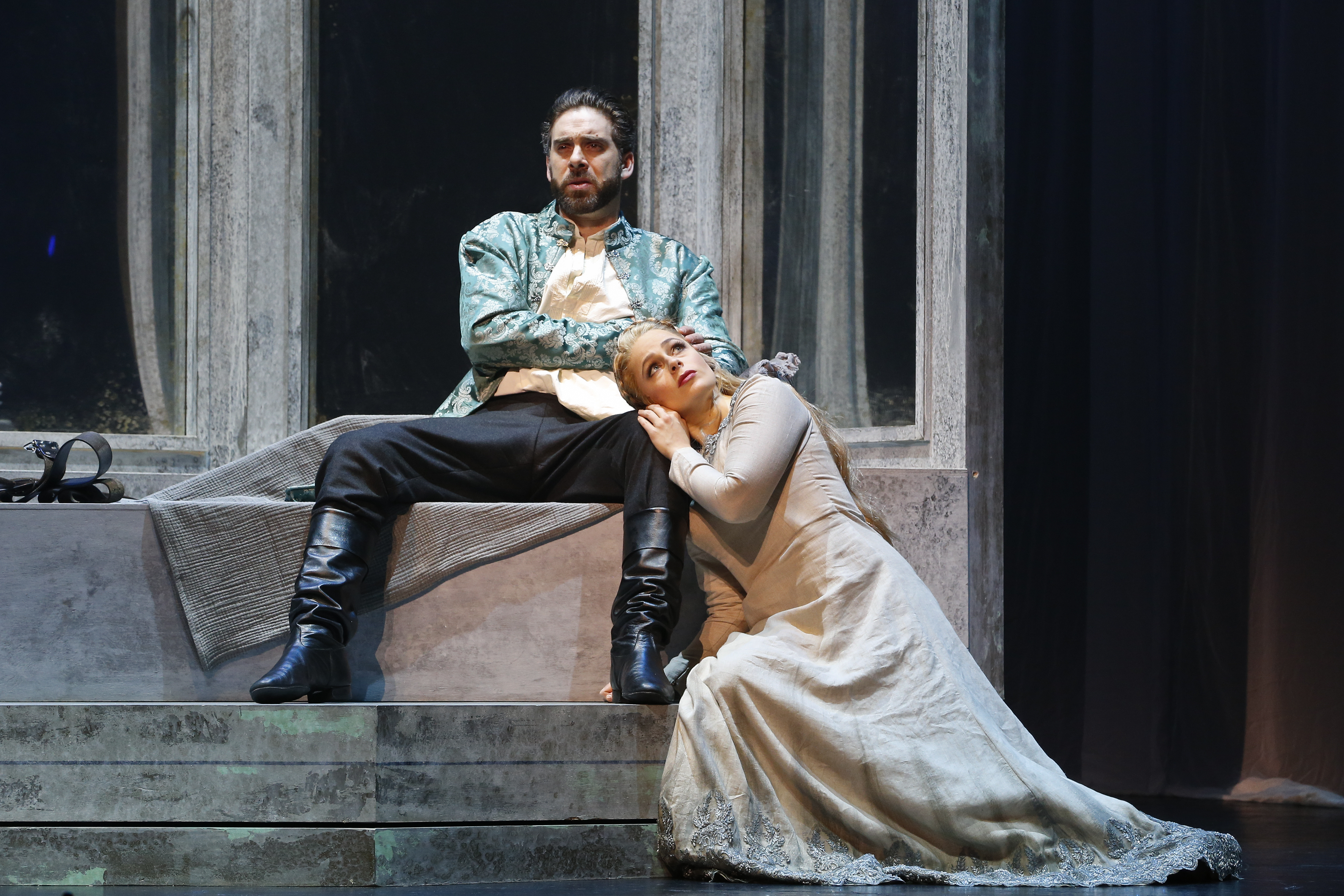
“Siobhan Stagg’s return home a sublime triumph. It’s not often a soprano comes along with the ability to sing with both thrilling frisson and total tranquility … Siobhan Stagg’s Melisande was transcendent … Her voice is one of real beauty, completely even from top to bottom… We can only hope it’s not too long before she returns home to perform again.” Bridget Davies, The Age / Sydney Morning Herald.
“… vocally and dramatically compelling … Stagg, in particular, is an ascendant star, possessed of remarkable purity of tone, easy legato and a natural lyricism… a triumph.” Eamonn Kelly, The Australian.
“…ethereal, enigmatic and fragile as Mélisande, (Stagg) sang with clarity and tenderness … a daring success.” Patricia Maunder, Limelight Magazine.
“Siobhan Stagg is sublimely cast as Mélisande.”
Lois Maskiell, Theatre Press.
“It was a coup having the exquisitely nuanced Australian soprano Siobhan Stagg back home … Stagg brought layers of colour to Mélisande’s character and vocal splendour to match… the voice’s liquid class and affecting iridescence one hopes to see back in Melbourne again soon.” Paul Selar, Opera Chaser.
“In a sterling performance, Stagg sings with a delectably golden tone, producing vocals of unwavering purity … Stagg maintains a serene presence, culminating in a moving deathbed scene.” Simon Parris, Man In Chair.
Critical acclaim for Pamina in Die Zauberflöte (The Magic Flute) at the Royal Opera House, Covent Garden in London, September 2017:
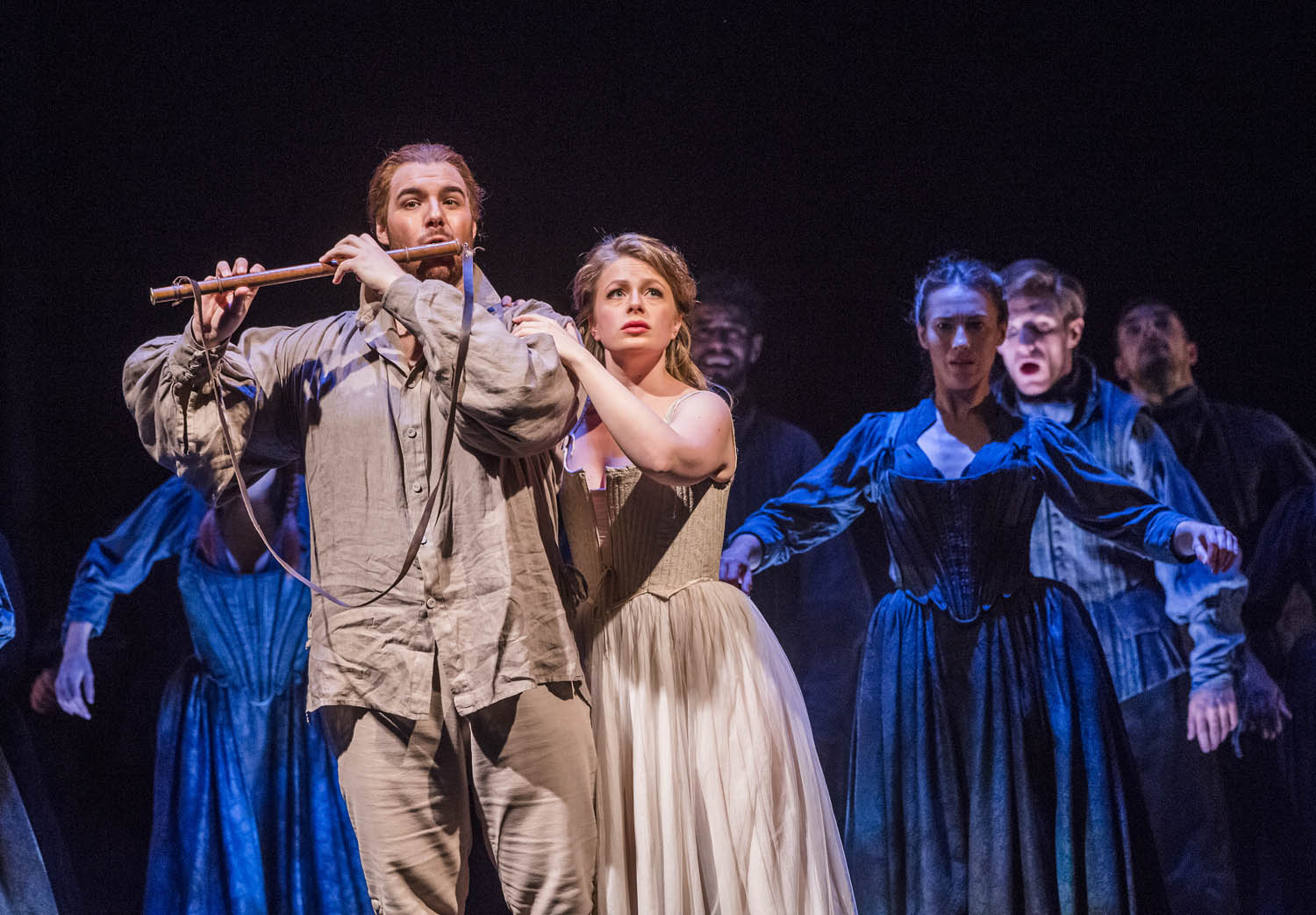
“Best of all was Siobhan Stagg, a Pamina who seemed completely suited to the role, releasing a stream of beautiful sound when needed, and with the heft and passion to make ‘Die Wahrheit’ the hinge of the entire drama.” Roger Parker, Opera Magazine (UK).
“Two stand-out performances anchor this Flute. As the heroine Pamina, Siobhan Stagg is a touching and musically delicious discovery – although those of us fortunate to have heard her jump-in account of Rossi’s Orpheus would expect nothing less. The young Australian is the next big thing.” Mark Valencia, What’sOnStage.
“… Peter meets his match in Stagg’s animated and expressive use of the text, sensitive, stylish phrasing and beautifully clear timbre. Far from being rescued by Tamino, it is Pamina who rescues her prince by taking his hand and leading him through the trials.” Anna Picard, The Times.
“(Siobhan Stagg) really seems to mean every word. Hers is a warm, lithe soprano, and one that captures the character’s girlishness.” Hannah Nepil, Financial Times.
“… Australian soprano Siobhan Stagg was pure delight in the role to which she brought a deliciously clear voice and fine acting skills.” William Hartson, Express.
“Australian soprano Siobhan Stagg offers an attractively sung Pamina.” George Hall, The Stage.
“Siobhan Stagg’s Pamina was an assertive heroine, but also affecting in her Act Two misery, floating high notes with the utmost control.” Bernard Hughes, The Arts Desk.

“Siobhan Stagg gave a glorious performance as Pamina. It was a heartfelt portrayal of great poise with a voice of sensitive clear timbre and a flawless technique. Her Act II aria Ach, ich fühl’s received rapturous applause, and deservedly so.” Alistair Jackson, ABR Arts (Australian Book Review)
“Siobhan Stagg’s Pamina puts heart and soul into ‘Ach, ich fühl’s’ … also deeply moving, with her impassioned, yet controlled, singing … Siobhan Stagg makes an extremely impressive Royal Opera main stage debut, bringing her sweet soprano to the fore in her very committed and astutely observed performance.” Sam Smith, MusicOMH.
“Williams was at his finest, though, with Siobhan Stagg’s plucky Pamina in “Bei Männern, welche Liebe fühlen” … Williams and Stagg sang with great tenderness and simplicity.” Mark Pullinger, Bachtrack.
“(Siobhan Stagg) gave a strong Pamina throughout the evening. The sound of her voice was rich and moved with ease, giving an extremely heartfelt performance of Pamina’s suicide aria.” John Beckett, Schmopera.

—————————————————————————————————————————————–
Reviews for Haydn Die Schöpfung at the Haydn Festival in Vienna, with Enrique Mazzola and the Orchestre National d’Ile de France, August 2017:
“Sopranistin Siobhan Stagg und Tenor Matthew Newlin beglückten durch Geschmeidigkeit und Glanz.” Stefan Ender, Der Standard.
(Translation: Soprano Siobhan Stagg and tenor Matthew Newlin delighted with their suppleness and brilliance.)
—————————————————————————————————————————————–
Reviews for Handel Ode to Saint Cecilia’s Day with Matthew Halls and the Auckland Philharmonia in New Zealand, August 2017:
“…Siobhan Stagg’s exquisitely sung arias occasioned memorable duets with Eliah Sakakushev-von Bismarck’s cello and Jennifer Seddon-Mori’s flute.” William Dart, New Zealand Herald.
—————————————————————————————————————————————–
Critical acclaim Haydn Creation with Sir Andrew Davis and the Melbourne Symphony Orchestra, June 2017:
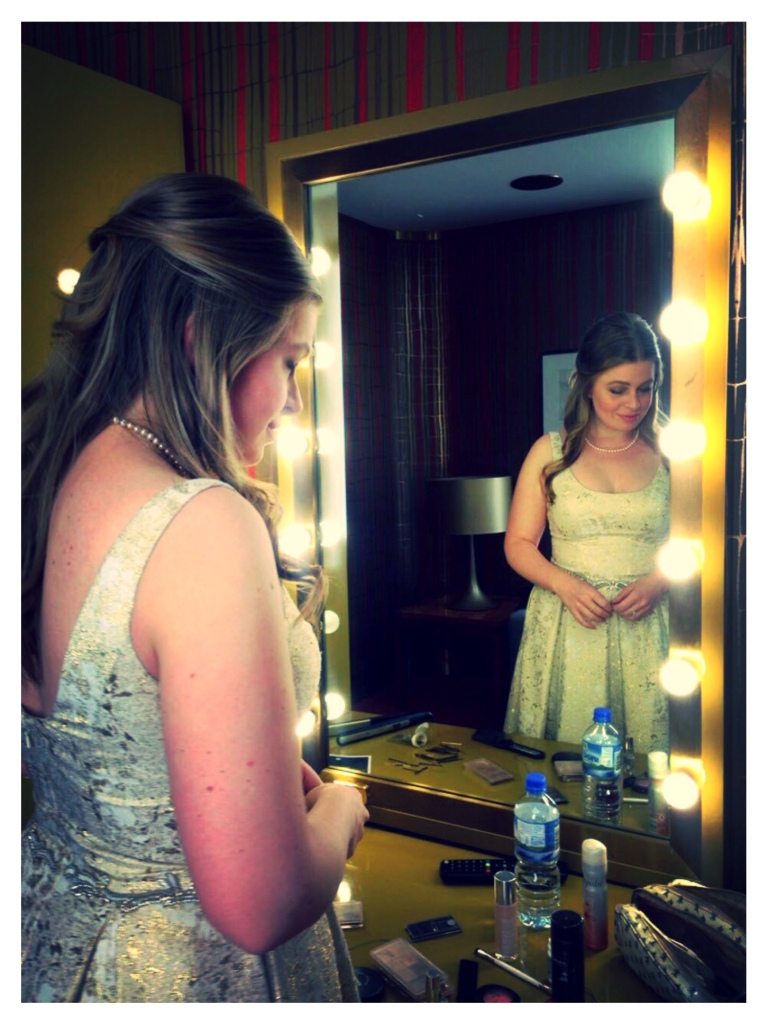
“Siobhan Stagg an unalloyed success in Melbourne Symphony Orchestra recital… well-suited to both Gabriel and Eve roles, she demonstrated unerring accuracy in the composer’s tensile upper-line arcs and occasional rapid ornamental flourishes, as well as having a creamy fullness of timbre that gave weight and interest to her lower passages.” Clive O’Connell, The Age / Sydney Morning Herald.
“A key focus-point of the oratorio is, of course, its archangels Uriel, Gabriel, and Raphael, performed by (Andrew) Staples, (Siobhan) Stagg, and (Neal) Davies respectively… All performed convincingly – their duets and trios being the most compelling moments…” Ben Wilkie, Limelight Magazine.
“Siobhan Stagg’s Gabriel was exquisite –her luminous tone throughout the range was equally at ease with florid passagework and longer cantabile melodies, and her diction was always clear. Her serene appearance added to the effect.” Margaret Arnold, Classic Melbourne.
—————————————————————————————————————————————–
Praise for Pamina in Die Zauberflöte with Christophe Rousset and Les Talens Lyriques at Opera de Dijon and the Philharmonie de Paris, March/April 2017 and at Opera de Limoges, November 2017:
“Pamina est incarnée par la soprano australienne Siobhan Stagg – virevoltante Morgana (Alcina de Haendel) à Genève l’an passé – qui conjugue musicalité et émotion. La voix, ravissante et admirablement conduite, n’est pas très grande mais sa projection impeccable la fait sonner ronde et lumineuse, et la chanteuse met par ailleurs un point d’honneur à ciseler chaque note, chaque trait, et chaque mot avec un soin remarquable.” Emmanuel Andrieu, Opera-Online.
(Translation: Pamina is played by Australian soprano Siobhan Stagg – twirling Morgana (Alcina de Haendel) in Geneva last year – combining musicality and emotion. The voice, beautiful and admirably produced, is not very big but its impeccable projection makes it ring bright and round. The singer makes it a point of honour to carve each note, each line, and each word with remarkable care.”)
“L’air “Ach, ich fühl’s” résume quant à lui les talents de Pamina, assurée dans des graves chauds qui montent avec justesse vers des aigus rondement menés. Généreuse en souffle, Siobhan Stagg est délicate et sonore à l’envi, souvent émouvante …” Charles Arden, Olyrix.
(Translation: The air “Ach, ich fühl’s” summarizes the talents of Pamina, assured in hot seriousness that rises with accuracy towards a round and well-produced top. Generous in breath, Siobhan Stagg is delicate and sounds to the heart, often moving.)
L’air “Ach, ich fühl’s” résume quant à lui les talents de Pamina, assurée dans des graves chauds qui montent avec justesse vers des aigus rondement menés. Généreuse en souffle, Siobhan Stagg est délicate et sonore à l’envi, souvent émouvante
“Rayonnante Pamina, l’australienne Siobhan Stagg, membre de la troupe du Deutsche Oper de Berlin, remporte tous les suffrages grâce à sa grande voix de soprano lyrique, corsée et lumineuse, délivrant un beau « Ach ich fuhl’s » ainsi qu’un splendide suicide et surtout un « Tamino mein » où elle s’affirme avec grandeur.” Nicolas Grienenberger, Classique News.
(Translation: ‘Radiating’ Pamina, Australian Siobhan Stagg, a member of the Deutsche Oper Berlin, won all the votes thanks to her lyrical soprano voice, full-bodied and luminous, delivering a beautiful “Ach ich fuhl’s” as well as a splendid suicide and especially a “Tamino mein” where it asserts itself with greatness.)
“Sa Pamina (Siobhan Stagg) beauté vocale radieuse, voix longue et colorée nous émeut. Chacun de leurs airs, tout comme leur duo final avec le chœur sont des moments forts.” Yvan Beuvard, Forum Opera.
(Translation: Pamina (Siobhan Stagg) radiates vocal beauty, her big and colourful voice moves us. Each of her tunes, as well as their final duet with the chorus are highlights.)
“Formé de jeunes chanteurs à la fraîcheur bienvenue, le plateau vocal séduit… la Pamina sensible et fort belle musicienne de Siobhan Stagg.” Sophie Bourdais, Telerama.
(Translation: Young singers with a welcome freshness, the vocal level seduces … the sensitive Pamina and very beautiful musicianship of Siobhan Stagg.)
“La Pamina de Siobhan Stagg est toute en fraîcheur et en subtilité … on est sous le charme de sa voix claire et on a le cœur littéralement transpercé lorsqu’elle lance un « Fühlst du nicht der Liebe Sehnen » d’une sincérité et d’une intensité rares.” Jean-Marc Piriou, BachTrack.
(Translation: Siobhan Stagg ‘s Pamina is fresh and subtle, she charms with her clear voice, and one’s heart is literally pierced when she throws a ” Fühlst nicht der Liebe Sehnen ” of rare sincerity and intensity.)
—————————————————————————————————————————————–
For Strauss Lieder in recital at the Théâtre du Châtelet in Paris, February 2017:
“Siobhan Stagg et Attilio Glaser ont ouvert la soirée avec des lieder de Richard Strauss. La soprano australienne possède un aigu pur qui sied au compositeur avec une belle intelligence du texte et une touche de poésie en bonus.” Hugues Rameau-Crays, Classique.
Translation: Siobhan Stagg and Attilio Glaser opened the evening with Richard Strauss’ lieder. The Australian has a pure soprano that befits the composer with a beautiful intelligence of the text and a touch of poetry as a bonus.
—————————————————————————————————————————————–
For Zemlinsky’s Lyric Symphony with the BBC Symphony Orchestra, Christopher Maltman and conductor Simone Young at the BBC Proms, Royal Albert Hall in August 2016:
“…the Zemlinsky was revelatory… Soprano Siobhan Stagg and baritone Christopher Maltman gave thrilling voice to Tagore’s transcendent poems, set by a composer who has languished too long in the shadows of Mahler and Berg. (Simone) Young oscillated sublimely between metaphysical twin poles, pivoting male and female around Zemlinsky’s central ‘Sprich zu mir, Geliebte’; this a near narcotic rapture at the music’s yearning heart.” Steph Power, Independent.
“While Stagg’s is not an enormous voice, there’s a blade to its purity that helped it project in this challenging space, carrying text and emotion to the back of the hall. The emotional arc of her delivery – from the innocent intensity of “Mutter, der junge Prinz” to the chilly withdrawal of “Vollende denn das letzte Lied” – was the thread on which the songs were threaded, a guiding constant through this extraordinary, excessive work.” Alexandra Coghlan, The Arts Desk.
“…aided here by two notable soloists, Christopher Maltman… and Siobhan Stagg, a vivid story-teller with a potent stage presence… Particularly compelling was the fourth section given to the soprano – “Speak to me, my love! Tell me in words what you sang” – which was total wonderment, spellbinding…” Colin Anderson, Classical Source.
“Baritone Christopher Maltman and soprano Siobhan Stagg sang seven songs of lost love and acceptance. Wagner reverberated, Mahler echoed but respectful Zemlinsky kept his identity as the singers, without breaks, sang the seven songs tracing their feelings from joy to painful separation. There was something strangely satisfying in the work’s grandeur …” Jeffery Taylor, Express.
—————————————————————————————————————————————–
For the Roberto Alagna Australian Tour, with concerts at the Sydney Opera House Concert Hall & Hamer Hall, Melbourne in July 2016:

“Stagg was a standout. The young singer from Mildura has been creating a sensation in Europe with the legendary former German mezzo Christa Ludwig describing her voice as “one of the most beautiful I have ever heard”… (Stagg) and Alagna displayed great musical chemistry and a flair for comic timing… Their duets were excellent, particularly Donizetti’s inebriated Caro elisir! sei mio! From L’Elisir d’amore. And there was more fun with the crowd-pleaser Funiculi Funicula and a duet version of Santa Lucia.” Steve Moffat, Daily Telegraph.
“…Alagna shared the stage generously with ebullient European-based Australian soprano Siobhan Stagg… Stagg melted easily alongside Alagna, impressing with her bright and effervescent tone… Stagg by all means won hearts too, notably for her mellifluously delicate and pathos-filled O mio Babbino Caro.” Paul Selar, Herald Sun.

“In both her duet and solo items, Stagg displayed the piercing clarity and tonal purity than has won over European critics and listeners.” Murray Black, The Australian.
“…Australian soprano Siobhan Stagg well matched with Alagna. Her solo items were among the best things of the night. From a moving O mio babbino caro by Puccini, to a dazzling Non ti Scordar di me by Ernesto de Curtis.” James McCarthy, Limelight Magazine.
“… O mio babbino caro, sung beautifully by soprano Siobhan Stagg.” Michael Shmith, Sydney Morning Herald.
” Judging from the applause, many felt that Stagg’s rendition of O mio babbino caro was the operatic highlight of the evening. Intensely emotional and sung with full glorious tone… Her singing of Non ti scordar di me … was warm and relaxed. Soulful without being in the least saccharine or affected her interpretation was as well suited to the crossover style as Alagna’s… Alagna was totally charming as the enthusiastic but naive Nemorino and Siobhan Stagg was equally so as the wiser but equally charming Adina. Both were in terrific voice and immediately established a palpable rapport with the audience as well as each other.” Heather Leviston, Classic Melbourne.
“Alagna’s glamourous guest star, the elegant Siobhan Stagg was in fine form too, exquisitely and delicately moving in ‘O mio babbino caro’ from Puccini’s Gianni Schicchi for example, and having great fun in the enchanting duets (e.g. ‘Funiculi Funicula’ and ‘O Sole Mio’)… At the end of the performance there was a rapturous standing ovation. The audience would not let them go – Alagna and Stagg were required to do three encores and the audience were screaming for more.” Lynne Lancaster, Arts Hub.

————————————————————————–
For Blonde in Rodrigo Garcia’s Entführung aus dem Serail production at the Deutsche Oper Berlin, June 2016:
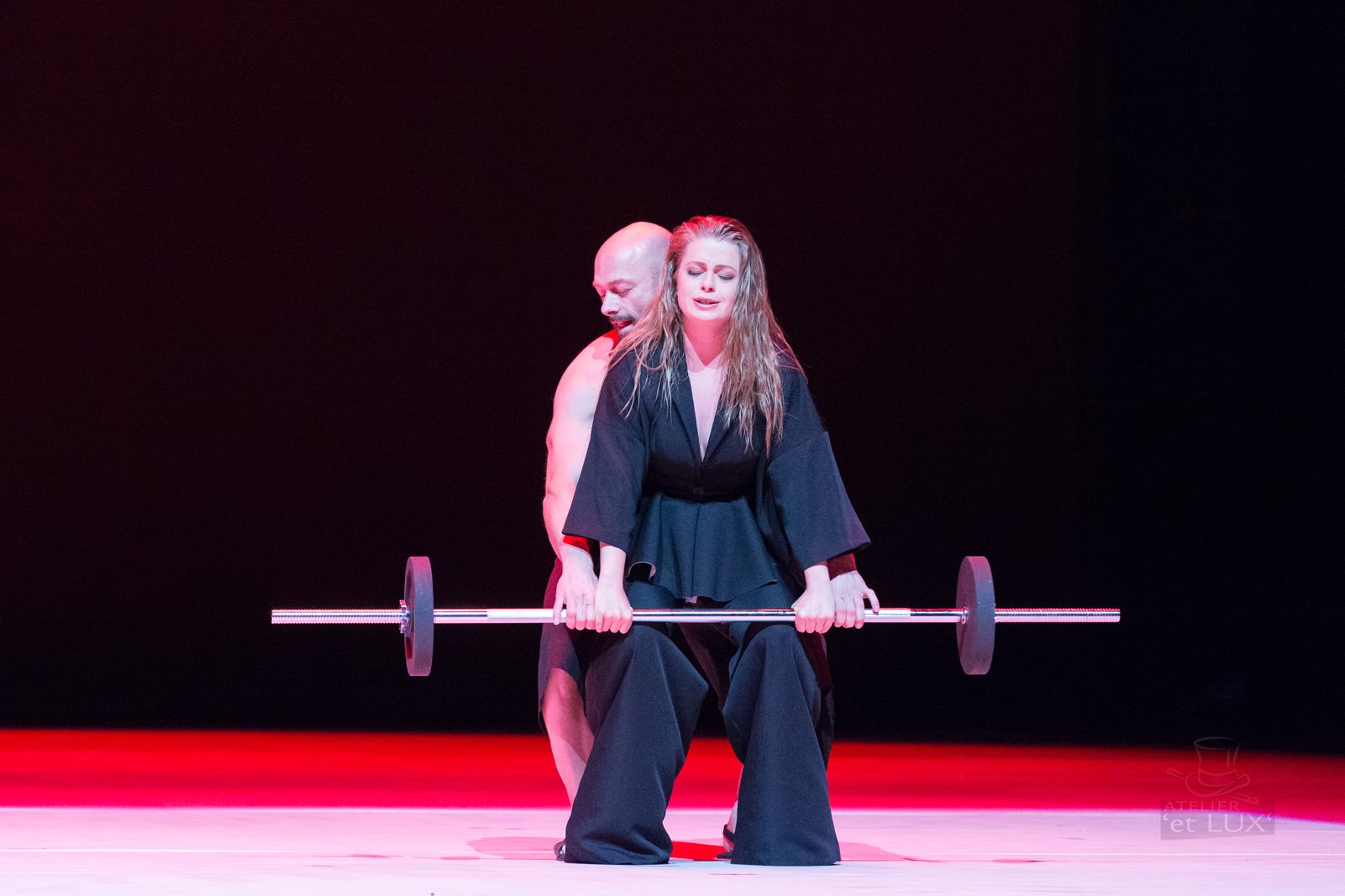
“Ein ernormer Besetzungstriumph… Schon Siobhan Stagg indes singt die Blonde saftiger als man das je hört sowie mit mirakulöser Höhensicherheit.” Kai Luehrs-Kaiser, Kultur Radio RBB
“…so sinnlich Siobhan Stagg als Blonde zu girren versteht” Jan Brachman, Frankfurter Allgemeine.
“Siobhan Stagg bringt einen kernigen Kontrollwillen in die Darstellung der Blonde ein.” Ulrich Amling, Tagesspiegel.
“…Blondchen, von Siobhan Stagg gegeben, zeigt graziös schönen Klang und Musikalität.” Theo Hoflich, Klassik Magazine.
“Großartige Sängerdarstellerleistungen boten insbesondere der Sopranistinnen Kathryn Lewek und Siobhan Stagg, die ihre Arien gymnastisch darbieten und Partner singend anspringen.” Peter P. Pachl, Neue Musikzeitung.
—————————————————————————————————————————————–
For Sophie in Der Rosenkavalier at the Deutsche Oper Berlin, April 2016:
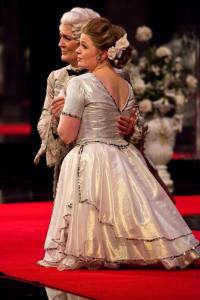
“Le plateau trouve un véritable attrait avec la Sophie de Siobhan Stagg, jeune colorature montante de la troupe de Berlin, entendue aussi l’an passé dans un Deutsches Requiem remarqué avec les Berliner Philharmoniker. Le contrôle de la ligne et la capacité à tuber les notes aiguës impressionnent autant que la belle couleur du grain dans le médium, auquel s’ajoute une fraîcheur du jeu en scène.” Vincent Guillemin, Alta Musica.
(Translation: The real attraction is Siobhan Stagg as Sophie, a rising young coloratura from the troupe in Berlin, who we also heard last year in Brahms’ Deutsches Requiem with the Berliner Philharmoniker. Her control of line and ability in the high range is as impressive as the beautiful color of the grain in the middle, plus a cool stage presence.)
“Australian Siobhan Stagg sang a lovely Sophie tonight. In the Presentation of the Rose, her voice blended beautifully with Sindram’s. She also looked good on stage, her Sophie has just the right mix of spunkiness and girlish charm.” Joseph So, Musical Toronto.
“Sophie, en revanche, retrouve la délicatesse, la candeur et le tempérament qu’il lui faut dans le chant de Siobhan Stagg. La soprano se rit des notes filées et demi-teintes et maintient l’intégrité d’un timbre élégant tout du long.” Yannick Boussaert, Forum Opera Magazine.
(Translation: Siobhan Stagg finds the delicacy, candor and temperament she needs for Sophie…. and maintains the integrity of an elegant tone throughout.)
“Stagg was something very special indeed. The voice is exceptionally well placed … it carries nicely through the theatre…. It’s a sound that shimmers yet she also works off the text producing singing of genuine character,” OperaTraveller.
—————————————————————————————————————————————–
For Morgana in Handel’s ALCINA, Grand Theatre de Geneve, February 2016:
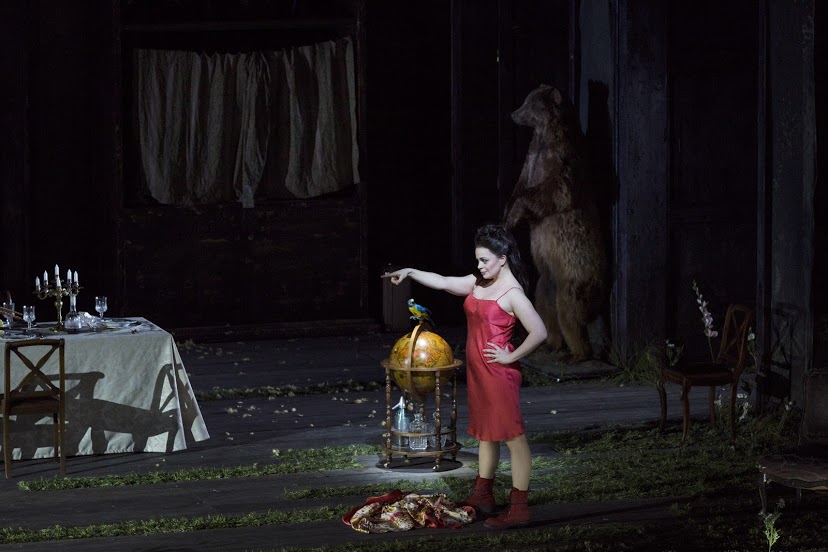
“La Morgana de Siobhan Stagg fut délicieuse d’un bout à l’autre de l’opéra. « Tornami a vagheggiar », air plein de malice, fût ourlé de belles coloratures soulignées par un orchestre rutilant. Son interprétation tout au long de l’opéra fut un bonheur et son air « Ama sospira » témoigna de l’émotion que permettent une vocalité généreuse et un instrument sain et totalement maîtrisé. On aurait aimé que le violon solo fut aussi libre que la soliste dans cet air somptueux. Son « Credete al mio dolore » restera un des plus beaux moments musicaux de cette soirée, la soprano australienne déployant beaucoup d’émotion dans un duo déchirant avec le superbe violoncelle de François Guye dont on goûte régulièrement la juste musicalité et le style parfait et qui a su ourler magnifiquement son discours avec celui de la chanteuse.” Thomas Muller, Bachtrack.
(Translation: The Morgana of Siobhan Stagg brought a delicious end to the opera. ‘Tornami a vagheggiar’, an aria full of mischief, was hemmed with beautiful coloratura, supported by the gleaming orchestra. Her performance throughout the opera was a joy, and her aria ‘Ama sospira’ expressed emotion that allowed a generous vocalism with her healthy and fully-controlled instrument. Her “Credete al mio dolore” will remain one of the finest musical moments of the evening, the Australian soprano displaying much emotion in a heartbreaking duet with the beautiful cello François Guye.)
“Au côté d’Alcina, la soprano Siobhan Stagg (Morgana) offre la fraicheur de sa voix fruitée qui, déjà, avait fait merveille dans la Marzelline dans le Fidelio du Grand Théâtre de Genève en juin dernier. Particulièrement apprécié son Credete al mio dolore du 3eacte en duo avec le beau ténor Anicio Zorzi Giustiniani (Oronte) qui, grâce au sublime et inspiré violoncelle obligato de François Guye, signent ensemble l’un des moments les plus émouvants de la soirée.” Jacques Schmitt, ResMusica.
(Translation: Alongside Alcina, soprano Siobhan Stagg (Morgana) offers her freshness of voice with which she already did wonders as Marzelline in Fidelio in Geneva last June. Particularly appreciated was Credete al mio dolore, the third act duet with the beautiful tenor Anicio Zorzi Giustiniani (Oronte). Thanks to the sublime and inspired cello obbligato of François Guye, this was one of the most moving moments of the evening.)
“Eine junge Soubrette mit riesigen lyrischen Reserven ist die Australierin Siobhan Stagg als mit deutlichem Kinderwunsch gesegnete Morgana.” Peter Krause, Concerti Magazine.
(Translation: A young soubrette with huge lyric reserves is the Australian Siobhan Stagg.)
“…haben es Stimmen einfacher im neuen Saal. Das demonstrierten insbesondere Siobhan Stagg als Morgana mit ihrem hellen und manchmal leicht schnippischen Sopran.” Tobias Gerber, Neue Zürcher Zeitung.
(Translation: Voices have it easier in the new hall. Thus demonstrated especially by Siobhan Stagg as Morgana with her bright and sometimes lightly pert soprano.)
“Idéale distribution… Ils trouvent dans cette production des interprètes à leur hauteur. Si on ajoute à cela la délicate et charmante Morgana de Siobhan Stagg, soprano léger agile et limpide… on doit bien conclure que cette distribution frôle l’idéal.” Christophe Imperiali, Le Courrier.
(Translation: Ideal casting … A generation of performers in their prime. If we add to that the delicate and charming Morgana of Siobhan Stagg, with her agile and limpid light soprano … it must be concluded that this cast borders on perfect.)
“Siobhan Stagg wiederum steigerte sich als Morgana … zu zarten Tönen kindlicher Klarheit.” Walter Weidringer, Die Presse.
(Translation: Siobhan Stagg rose again as Morgana… with delicate tones of childlike clarity.)
“Quant à Siobhan Stagg, elle campe avec justesse les traits espiègles et séducteurs de Morgane.” Rocco Zacheo, Tribune de Geneve.
(Translation: As for Siobhan Stagg, she played aptly the playful and seductive traits of Morgana.”)
“The cast was profoundly satisfying… (Siobhan Stagg) cut a delightful figure on stage.” Antoine Levy-Leboyer, Seen and Heard International.
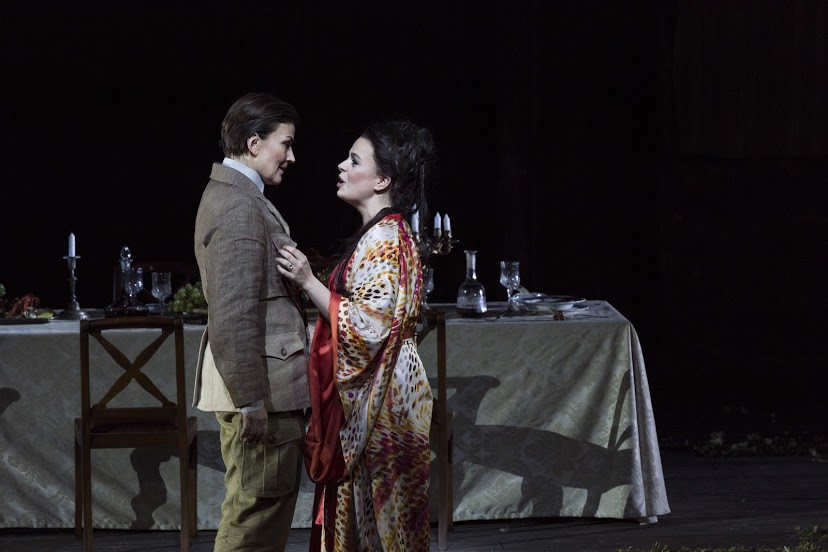
——————————————————————————————————-
For the title role in Royal Opera House’s ORPHEUS by Luigi Rossi held at Shakespeare’s Globe in London, October 2015:
(N.B. Siobhan was flown to London at short notice to take over the title role in this Keith Warner production for an indisposed colleague. Siobhan learnt the complete role in a few days, singing from the gallery in the first two performances before performing the complete role on stage for the following four shows in October 2015.)
“Powered by Christian Curnyn and his brilliant Early Opera Company band, this is an absolutely entrancing show… Siobhan Stagg sang it so convincingly from the gallery that the action spun seamlessly along.” Michael Church, The Independent.
“…gave us a chance to hear a new soprano of true individuality, Siobhan Stagg, delivering the part from above with stunning middle-range clarity and impeccable style.” David Nice, The Arts Desk.
“…Siobhan Stagg sang the notes beautifully from the gallery.” Richard Morrison, The Times.
“Stagg showed why her star is in the ascendant, combining a ravishing tone with pinpoint accuracy. Her vibrant soprano combined wonderfully with Louise Alder’s richly coloured Eurydice.” Claire Seymour, Opera Today.
“… Siobhan Stagg’s moving Orpheus…” Hugh Canning, The Sunday Times.
“… the role of Orpheus, it was sung (very well indeed) from the gallery by Siobhan Stagg.” Andrew Clements, The Guardian.
“…Stagg showed that she certainly has the voice for the role… we were treated to some truly lovely arias from Stagg’s Orpheus…” David Karlin, Bachtrack.
“Mary Bevan gallantly mimed the title role, while at short notice Siobhan Stagg sang her music prettily above the stage.” Rupert Christiansen, The Telegraph.
“Siobhan Stagg sang stylishly from the gallery, her lament “Come, my tears! Why no weeping?” especially touching. Together they made an engaging team; there were times when you couldn’t see the join.” Mark Valencia, What’s On Stage.
“…Siobhan Stagg singing — with impressive fluency at short notice — from the gallery.” Barry Millington, Evening Standard.
“…Siobhan Stagg did a masterly job of providing the vocal line.” Hannah Nepil, Financial Times.
“…Siobhan Stagg delivered the part impeccably from the gallery above.” Clare Colvin, Express.
“… musico-theatrical commitment of a very high order … a soprano of considerable musical gifts, showing clarity and warmth to be anything but antithetical.” Mark Berry, Seen and Heard International.
“Keith Warner’s staging was ingenious, gripping… with standout performances from Siobhan Stagg as Orpheus…” Fiona Maddocks, Freaky Party.
“…the singers – uniformly excellent actors – make everything as emotionally clear as possible. Siobhan Stagg has an exquisitely rich voice which she uses with impressive subtlety…” Warwick Thompson, Blouin Art Info International.
“…it was a chance to hear the next generation of voices. Between Louise Alder, Siobhan Stagg, Keri Fuge and Lauren Fagan it’s a future with no shortage of superb sopranos.” Alexandra Coghlan, The Spectator.
“(Siobhan Stagg) sang it so well… bringing a real buy-one-Orpheus-get-one-free flavour to the event.” William Harrison, Express.
——————————————————————————————————-
For the ARD International Music Competition with the Munich Radio Orchestra conducted by Darrell Ang at the Prinzregententheater in Munich, September 2015:
Siobhan was featured in a 30-minute documentary by BR-KLASSIK radio during the ARD Competition in Munich. Reporter Anna Novak took an intimate look into Siobhan’s journey, from her modest beginnings in Australia to the grand stages of Europe. You can listen to the interview via this link.
“…die Australierin Siobhan Stagg begeisterte mit dieser Arie, sang sie mit ihrem reichen lyrischen Timbre naturgemäß inniger, staunender und introvertierter, bezauberte auch als Händels Cleopatra (“Piangerò la sorte mia”).” Klaus Kalchschmid, Süddeutsche Zeitung.
(Translation: …the Australian Siobhan Stagg thrilled with this aria, she sang with her rich lyrical timbre and a natural intimacy, astonishing and introverted, and charmed also as Handel’s Cleopatra.)
“Und da ist schließlich die Australierin Siobhan Stagg … Was für eine lebendige Schönheit der Stimme, welche Freiheit in der Farbgebung, was für eine frische Offenheit der Gestaltung! Hier werden, in Arien aus Gounods Faust und Händels Giulio Cesare, innerhalb weniger Minuten ganze Figuren lebendig. Siobhan Stagg verfügt über eine mühelose Höhe, sie erfüllt in der Händel-Arie auch einfachste melodische Linien mit darstellerischer Aufrichtigkeit. Bravo!” Michael B. Weiss, Klassik Heute.
(Translation: And finally there is Siobhan Stagg… What a vivid beauty of the voice, such freedom in the color scheme, what a fresh openness of style! Singing arias from Gounod’s Faust and Handel’s Giulio Cesare, within a few minutes all the characters come alive. Siobhan Stagg has a effortless height, giving in the Handel aria simple melodic lines with real sincerity. Bravo!)
For Faure Requiem with the West Australian Symphony Orchestra and Chorus conducted by Simone Young at the Perth Concert Hall, August 2015:
“Performance of rare beauty… Pie Jesu was most movingly sung by Siobhan Stagg.” Neville Cohen, The West Australian.
Listen to ABC Classic FM’s national radio broadcast via the LISTEN AGAIN feature.
For Lieder des Abschieds: Recital of Strauss and Korngold with pianist Eidit Golder at the Melbourne Recital Centre, July 2015:
“Seriously spectacular… revealing a luscious and full-bodied tone.” “Her coloratura is something to behold…” “There can be no doubt, Siobhan Stagg really is something special.” Alexandra Mathew, Limelight Magazine.
Read Limelight Magazine’s full glowing review here.
Listen to ABC Classic FM’s radio broadcast of this recital via the LISTEN AGAIN feature.
For AIMS Gala Concert in the Graz Musikverein, July 2015:
“‘Ehrengast’ Stagg betörte in zwei französischen Opernszenen mit ihrem in allen Lagen und Abstufungen ausgeglichenen, kostbaren Timbre.” Walther Neumann, Kleiner Zeitung.
(Translation: ‘Guest of honour’ Stagg infatuates with her evenly nuanced and sumptuous timbre.)
For Marzelline in Beethoven’s FIDELIO at the Grand Théâtre de Genève, Switzerland in June 2015:
“Une mention spéciale, enfin, va à Siobhan Stagg, une Marzelline dont l’élan juvénile et le timbre solaire ont envoûté.” Rocco Zacheo, Tribune de Geneve.
(Translation: Special mention goes to Siobhan Stagg, whose youthful enthusiasm and golden timbre were spellbinding.)
“Siobhan Stagg (Marzelline) est l’heureuse surprise de la distribution, soprano frais et fruité.” Julian Sykes, Le Temps.
(Translation: Siobhan Stagg is the happy surprise of the production, her soprano fresh and fruity.”
“Charmants Marzelline (Siobhan Stagg) et Jaquino (Manuel Günther), rayonnants de jeunesse.” Emmanuel Dupuy, Diapason Magazine.
(Translation: Marzelline (Siobhan Stagg) and Jaquino (Manuel Günther) are charming, radiating youthful energy.)
“As for the singers, they are an excellent cast altogether… Marzelline sounded particularly lovely, tone soft and timbre perfectly blended…” Elodie Olson-Coons, Bachtrack.
“Siobhan Stagg’s Marzelline was delightful: the Australian soprano has easy flowing notes and nice phrasing. It shows once again the Grand Theâtre’s ability to spot promising singers.” Antoine Levy-Leboyer, Seen and Heard International.
“…la soprano australienne Siobhan Stagg (Marzelline) est très à l’aise scéniquement et sa voix superbement fruitée fait merveille dans le rôle.” Jacques Schmitt, ResMusica.
(Translation: The Australian soprano Siobhan Stagg (Marzelline) is very at ease in her scenes and her superb voice works wonders in this role.)
“Prestations remarquées … surtout de l’agile Siobhan Stagg en Marzelline, d’une fraîcheur de ton printanière. Michel Le Naour, Concert Classic.
(Translation: Remarkable presentations… especially from the agile Siobhan Stagg, who gave spring-like freshness to her Marzelline.)
For Bernstein’s A QUIET PLACE with Ensemble Modern conducted by Kent Nagano, April 2015:
“Dede wurde von der großartigen Siobhan Stagg in der prekären Spannung zwischen Mädchen-von-Nebenan-Nettigkeit und Hysterie gehalten. Staggs reiner, instrumental geführter Sopran und ihre nuancenreiche Gestaltung waren ein Höhepunkte eines hörenswerten Abends.” Edda Breski, WA.de
(Translation: The magnificent Siobhan Stagg kept the character of Dede suspended between ‘girl-next-door’ niceness and hysteria. Stagg’s pure, instrumental and controlled soprano with nuanced design were a highlight of the evening.)
“Strahlende Sopranmomente zelebriert Siobhan Stagg als Tochter Dede… Zu Recht gibt es heftigen Applaus.” Martin Schrahn, Der Westen.
(Translation: Radiant soprano moments were celebrated by Siobhan Stagg as daughter Dede… There was rightly fierce applause at the end.)
For Brahms’ REQUIEM with the Berlin Philharmonic conducted by Christian Thielemann, January 2015 (replacing Sibylla Rubens at short notice):
“The Australian soprano, who has been making a name for herself in Germany since she joined the Deutsche Oper Berlin as a young artist in 2013, has been asked by Staatskapelle Dresden supremo Christian Thielemann to sing in performances on Thursday, Friday and Saturday this week.” From the article, “Aussie soprano Siobhan Stagg gets her Berlin Phil call-up”, Clive Paget, Limelight magazine.
“Und erwähnt werden muss auch Siobhan Stagg, die ihrem Part (“Ihr habt nun Traurigkeit”) herb-diesseitige “Engelhaftigkeit” verlieh; es klang zum Weinen schön.” Andre Sokolowski, Der Freitag.
(Translation: Mention must also be made of Siobhan Stagg, who gave an earthly angelic quality to her part ‘Ihr hat nun Traurigkeit’; it sounded so beautiful you could cry.)
“Siobhan Stagg, die kurzfristig für die erkrankte Sibylla Rubens eingesprungen war, erstrahlte zu ihrem „Ihr habt nun Traurigkeit“ mit himmlischen Kopftönen und einem engelsgleichen, an die unvergleichliche Gundula Janowitz erinnernden Sopran.” Kirsten Liese, KulturExpress.
(Translation: Siobhan Stagg, who was standing in for the ill Sibylla Rubens at short notice, shone in “Ihr habt nun Traurigkeit” with her heavenly high tones and an angelic quality reminiscent of the incomparable soprano Gundula Janowitz.)
For Handel’s MESSIAH with the Melbourne Symphony Orchestra conducted by Matthew Halls at Hamer Hall, December 2014:
“In many respects, this year’s inevitable Handel oratorio stood out from the usual run… soprano Siobhan Stagg outclassed her peers for an unfussed, clear delivery, giving full satisfaction every time she stood up.” Clive O’Connell, The Age.
“Siobhan Stagg’s bright and clear soprano was the real highlight of the night. It was an exquisitely judged performance in every recitative and aria. She has a great stage presence and the luminescent quality of her voice (especially the top notes, but evident throughout her range) brought tears for some audience members. Her “How beautiful are the feet” was extraordinarily radiant. May the memory of this never dim.” Peter Williams, Classic Melbourne.
For Handel’s MESSIAH with the Adelaide Symphony Orchestra conducted by Matthew Halls, November 2014:
“Soprano Siobhan Stagg has a gorgeous lyric voice, bright as a bell.” Peter Burdon, The Adelaide Advertiser.
“Soprano, Siobhan Stagg has a delightfully true voice with a relaxed, almost imperceptible vibrato. Her performance of ‘I Know That My Redeemer Liveth’ has a joyous simplicity that won the audience over and put a gentle smile on the faces of many.” Kym Clayton, The Barefoot Review.
“Soprano Siobhan Stagg was a joy to listen to all night, her “There were Shepherds” and “For now is Christ Risen” her highlights. Stagg has an engaging sweetness, and beautiful voice with very clear diction.” Brian Angus, Backtrack.
For Bach MAGNIFICAT at St Paul’s Cathedral, Melbourne, November 2014:
“Outstanding amongst the soloists was Siobhan Stagg who gave a performance of simplicity and ease with the style. This was through beautifully nuanced singing through all registers. It was delightful for its clarity, openness of tone and well-articulated runs.” Peter Williams, Classic Melbourne.
For Haydn HARMONIEMESSE with Tasmanian Symphony Orchestra conducted by Johannes Fritzsch, November 2014:
“Soloists Siobhan Stagg, soprano, Sally-Anne Russell, mezzo, Henry Choo, tenor, and Andrew Collis, bass, were impeccably balanced and even-toned at every entry.” Elizabeth Ruthann, The Mercury
For Najade in ARIADNE AUF NAXOS at the Berlin Philharmonie, conducted by Ulf Schemer in October 2014:
“The trio of mythic beings Naiad, Dryad and Echo were very different voice types, but the blend was still very pleasing: the versatile Siobhan Stagg delivered some delightful liquid roulades in her upper register as Naiad, underpinned by solid performances from Ronita Miller (Dryad) and Elena Tsallagova (Echo). Their later trio “Ein schönes Wunder” was particularly lovely.” David Larkin, Bachtrack.
For Bach’s Mass in B minor with the Melbourne Symphony Orchestra conducted by Stephen Layton, August 2014:
“It has been sixteen years since the Melbourne Symphony Orchestra last performed Bach’s sublime Mass in B minor – far too long. Perhaps they were waiting for Siobhan Stagg… With a chamber sized MSO under the expert direction of Stephen Layton, Stagg gave a convincing demonstration of why she is attracting an increasing number of international plaudits and invitations to perform in operas, oratorios and recitals. A radiant performer with a limpid purity of voice and resonant ease of production, she is an ideal exponent of Bach’s music. Not only was her aria beautifully sung, but her vocal command and musical sensibility resulted in a graceful and gratifying blend of voices in her duets with counter-tenor Christopher Lowery and tenor Nicholas Mulroy.” Heather Leviston, Classic Melbourne.
For Bach’s St John Passion with the Auckland Philharmonia Orchestra, conducted by Stephen Layton in August 2014:
“…Australian Siobhan Stagg made exquisite music out of Bach’s vocally testing soprano arias.” William Dart, New Zealand Herald.
“After a charmingly perky “Ich folge dir gleichfalls”, [Siobhan Stagg] summoned a surprising depth of feeling for “Zerfliesse, mein Herze”, sorrow colouring her phrases.” Simon Holden, Bachtrack.
For the Final of the Belvedere Singing Competition with the Duisburger Philharmoniker conducted by Axel Kober in Düsseldorf, Germany in July 2014:
“…eine Sängerin mit der hochkarätigsten Goldkehle, die man sich denken kann: Die Preisträgerin ist Sopranistin, heißt Siobhan Stagg und kommt aus Australien. Sie sang die Arie der Louise aus Gustave Charpentiers gleichnamiger Oper mit solch vollendeter Ton-Schönheit, dass man süchtig werden konnte nach dieser Stimme. Erfreulicherweise ergriff hier die Rheinoper die Gunst der Stunde und engagierte die Sängerin vom Fleck weg.” Lars Wallerang, Westdeutsche Zeitung (Germany)
(Translation: “… a singer with the most prestigious gold throat [sic] that you can imagine: the prizewinner is a soprano called Siobhan Stagg and she comes from Australia. She sang the aria from Gustave Charpentier’s LOUISE with such consummate beauty of tone that you could be addicted to this voice. Fortunately, the Deutsche Oper am Rhein took advantage of the situation and engaged the singer on the spot.”)
“Mijn grote favoriet van deze avond was Siobhan Stagg, die de mediajury kennelijk ook overtuigde. Je hoorde het aan de brava’s uit de zaal: ze is echt een complete zangeres. Intelligent gezongen, een prachtige stem.” Jan Meulendijks, quoted by Francois van den Anker, Opera Magazine (Holland)
(Translation: “My favorite of the evening was Siobhan Stagg, who also convinced the media jury. You heard it from the ‘bravas’ from the audience: she really is a complete singer. Intelligent, and with a beautiful voice.”)
“Le jury de la presse internationale a cependant préféré primer la soprano australienne Siobhan Stagg dont l’interprétation de « Depuis le jour » a illuminé la soirée.” Christoph Rizoud, Forum Opera (France)
(Translation: The jury of the international press preferred the Australian soprano Siobhan Stagg, who illuminated the evening with her interpretation of ‘Depuis le jour’.)
“Siobhan Stagg überrascht mit einer unerhört mühelosen und beeindruckenden Klangproduktion, die die Arie Depuis le jour zu einem Ereignis macht.” Christoph Broermann, Opernnetz (Germany)
(Translation: “Siobhan Stagg surprised with an incredibly effortless and impressive sound production, making the aria ‘Depuis le jour’ into an event.”)
For Werther at the Berliner Philharmonie, conducted by Donald Runnicles, June 2014:
“Siobhan Stagg sang an excellent Sophie, her soprano bright and crystal clear. Sophie, too, gets a bad rap for her continual cheer, but Stagg brought gravitas to the role. “Du gai soleil, plein de flamme” was sung with exquisite sweetness; there was nothing cloying in Stagg’s performance. Later, in the Act III scene with Charlotte, she was sensible and kind, worried about her sister’s increasing morbidity.” Christie Franke, Bachtrack.
“…die junge Australierin Siobhan Stagg als Sophie beeindruckt nachhaltig. Ihr eleganter, hellfarbener Sopran bringt lyrische Leichtigkeit in die Musik… Siobhan Stagg ist die einzige im Ensemble, die Massenets Oper wirkliche französische Färbung verleiht.” Felix Stephan, Berliner Morgenpost.
(Translation: “The young Australian Siobhan Stagg makes a lasting impression as Sophie. Her elegant, light-coloured soprano brings a lyrical lightness to the music… Siobhan Stagg is the only one in the ensemble who gives a true French colouring to Massenet’s opera.”)
“…mijn favoriet was Siobhan Stagg als de 15-jarige Sophie, een frisse, heldere soubrette met een heerlijke persoonlijkheid, die de verfoeilijke entrees en exits van een concertante uitvoering beter dan de anderen vormgaf.” Kurt Gänzl, Opera Magazine (Holland)
(Translation: “My favourite was Siobhan Stagg as the 15-year-old Sophie, a fresh, bright soubrette with a wonderful personality, she made the odious entrances and exits of a concert performance better than the others.”)
For Christa Ludwig Public Masterclass at the Deutsche Oper Berlin, June 2014:
“… (Siobhan Stagg) konnte an diesem Abend eine besonders reife Leistung zeigen. “Bei Männern, welche Liebe fühlen” überzeugte der empfindsame lyrische Sopran voll schöner Klarheit, als Händels Cleopatra zeigte sich die blonde, geschmeidige Stimme ausgewogen zwischen instrumentaler Führung und gebotener Emotion, die Geläufigkeit in den Koloraturen und eine wunderschön gesungene Fermate konnten vollends überzeugen. Als Charpentiers Louise wusste der Sopran weitere Trümpfe auszuspielen mit einem deliziösen Vortrag, souveränem Spiel mit den Tönen und einem schönen Fluss der Stimme. Das Piano ist ausgesprochen farbig und da An- und Abschwellen des letzten Tons zeugte von einer ausgereiften Technik.” Ingrid Wanja, Der Opernfreund.
For Lear at the Hamburg State Opera, conducted by Simone Young, May 2014:
“…die Neubesetzung der Cordelia durch junge, australische Sopranistin Siobhan Stagg kann wohl als Glücksgriff bezeichnet werden; zeigte sie doch an diesem Abend, wie sehr auch junge Künstler in der Lage sind, derart schwierige Partien bzw. komplexe Figuren adäquat auf die Bühne zu bringen.” Michael Schenk, Tamino Klassikforum.
(Translation: “The re-casting of Cordelia with young Australian soprano Siobhan Stagg can be described as a stroke of luck; proving on this occasion that young artists are more than capable of bringing such complicated characters to the stage.”)
For Les Troyens at the Deutsche Oper Berlin, conducted by Paul Daniel, April 2014:
“…Siobhan Stagg als Stipendiatin des Förderkreises der Deutschen Oper Berlin kann in der Hosenrille des Ascagne ihren samtigen lyrischen Sopran so recht zum Leuchten bringen. Wahrhaft eine solitäre Entdeckung, deren Namen man sich unbedingt merken muss. ” Dr. Ingobert Waltenberger, Der Neue Merker.
(Translation: “In the trouser role of Ascagne, Siobhan Stagg rightly brings to light her velvety lyric soprano. Truly a stand-alone discovery, whose name one should certainly remember.”)
“Ein quirliger Ascagne mit frischer Stimme war Siobhan Stagg.” Ingrid Wanja, Der Opernfreund.
(Translation: Siobhan Stagg was a lively Ascagne with fresh voice.)
For Rigoletto at the Deutsche Oper Berlin, conducted by Roberto Rizzi Brignoli, November 2013:
“Siobhan Stagg war eine schönstimmige Gräfin Ceprano.” Ingrid Wanja, Der Opernfreund, December 2013.
(Translation: Siobhan Stagg was a beautifully-voiced Countess Ceprano.)
For Don Carlo at the Deutsche Oper Berlin, conducted by Donald Runnicles, October 2013:
“Siobhan Stagg sang eine anrührende Stimme vom Himmel.” Ingrid Wanja, Der Opernfreund, Nov 2013.
(Translation: Siobhan Stagg sang a touching Voice from Heaven.)
“Siobhan Stagg mit ihrem glockenhellen Sopran (sie ist bereits als Waldvogel im ‘Siegfried’ sehr angenehm aufgefallen) im Autodafe als eine junge Frau, der man das Kind nimmt-eigentlich ja die Stimme von oben.” Käthe Wegler-Heinze, Der Neue Merker.
(Translation: Siobhan Stagg with her bell-like soprano (already pleasantly noted as Waldvogel in ‘Siegfried’) plays the young woman whose child is taken-actually the voice from above.)
“Selbst die himmlische Stimme (Siobhan Stagg als Frau aus dem Volk) … erhalten zurecht großen Beifall.” Frank Piontek, Der Opernfreund, Nov 2013.
(Translation: Even the heavenly voice (Siobhan Stagg as a woman of the people)… rightly receives great acclaim.)
For Siegfried in Wagner’s Ring cycle, conducted by Sir Simon Rattle at the Deutsche Oper Berlin, September 2013:
“Siobhan Stagg sang den Waldvogel mit sehr schöner zarter Stimme.” Der Neue Merker, October 2013.
(Translation: “Siobhan Stagg sang the Woodbird with beautiful, delicate voice.”)
“Siobhan Stagg sang einen frisch-silbrigen Waldvogel.” Ingrid Wanja, Der Opernfreund.
(Translation: “Siobhan Stagg sang a fresh silvery Waldvogel.”)
For Das Rheingold in Wagner’s Ring cycle, conducted by Sir Simon Rattle at the Deutsche Oper Berlin, September 2013:
“Hervorragend sind Flüssigkeit und Klarheit der Rheintöchterszene… Siobhan Stagg (als) Woglinde…jugendlich schimmernder Sopran.” Opern- & Konzert Kritik Berlin.
(Translation: “The liquid clarity of the Rhine maidens scene is outstanding… Siobhan Stagg (as) Woglinde… a youthful, shimmering soprano.”)
“…die Rheintöchter angenehm leicht und klangschön besetzt… Da sie auch extrem wortdeutlich sangen, fast als würden sie Lieder von Mendelssohn vortragen, war es mir eine Freude, ihnen bei ihrem neckischen Spiel mit Alberich zuzuhören.” Dr. Kevin Clarke, Klassik.com
(Translation: “…the Rhine daughters were cast with a pleasantly light and beautiful sound… as they sang the text extremely clearly, almost as if they were presenting songs by Mendelssohn, it was a pleasure to listen to them at their game with teasing Alberich.”)
For the Salzburg Festival premiere of Jeanne d’Arc (Braunfels) with the Vienna ORF Radio Symphony Orchestra conducted by Manfred Honeck, 1 August 2013:
“A passionately performing cast, virtually without weaknesses but choc-full of delights furthered the experience. The small rôle of St. Catherine was helped to unexpected prominence by the wonderfully appealing, charismatic voice of soprano Siobhan Stagg, a fresh and healthy instrument, with friendly ease through every register.” Jens F. Laurson, Ionarts.
“Mit Siobhan Stagg und Sofiya Almazova gaben zwei Damen aus dem „Young Singers Projekt“ eine sympathische Kostprobe schöner Stimme,” Werner Häußner, Neue Merker.
For Salzburg Festival’s ‘Abschlusskonzert’ with Camerata Salzburg conducted by Theodor Guschlbauer, 23 August 2013:
“…two of the soloists are ready for the main stages of the world… Australian Siobhan Stagg, the most natural voice of the evening. Totally unpretentious and touching…” (translated excerpt from full German review: oe24.at)
For Hymne à l’amour CD launch with pianist Amir Farid, Melbourne Recital Centre, April 2013:
“These two skilled, accomplished and committed artists gave a wonderful concert of art songs…varied, attractive and finely chosen… Siobhan Stagg has a warm, skilful voice, accurate and flexible with a beautiful tone and sensitive phrasing… The intelligence, generosity and range of this concert were remarkable, and I am glad to relate that the songs have been recorded by Move Records…If you missed the concert, purchase of the CD is strongly advised!” Darryl Emmerson, Australian Stage.
“…a sensual, rich celebration of love…a well-paced and varied program…the opening item, Delibes’ Les Filles de Cadix, put one in mind of Carmen – as did Stagg, in a becoming, strapless red dress. The song was a good choice for her lovely rich voice, with trills and high notes confidently managed. Already well in command of the stage, Stagg described art song as a match of text and music… At last came the highlight of the concert: Zueignung by Richard Strauss… it gave Stagg’s voice the chance to soar… Simply a gem…. Both singer and pianist conveyed the beauty – and nostalgia – purely, authentically and entirely in harmony with each other.” Read the whole review by Suzanne Yanko for ArtsHub.
For Melbourne Symphony Orchestra’s ‘Mozart and Mahler’ concert at the Sidney Myer Music Bowl, February 2013, with an audience of 10,000 people:
“The best work of the night was in Mahler’s Symphony No. 4 with soprano Siobhan Stagg as radiant soloist in the work’s final movement.” Martin Duffy, The Age.
Praise for “Ay Portugal” CD with La Compania, released by ABC Classics in 2012:
“…the gorgeous voice of Siobhan Stagg – very pure, versatile and rich. I loved her voice…” Gary Higginson, MusicWeb International ‘Recording of the Month‘
“The soprano Siobhan Stagg has a lovely voice and handles the complicated Iberian rhythms with flying colours.” Manuel de Lara, Diverdi (SPAIN)
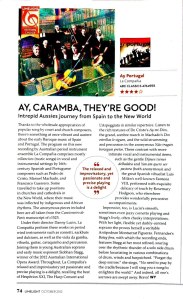
“The recording benefits hugely from the presence of the clarity and energy of soprano Siobhan Stagg,” Ivan Moody, Gramophone magazine.
“Impressive, too (is) Stagg’s lively, often cheeky interpretations. With her light, flexible yet darkly-centred soprano she proves herself a veritable Antipodean Montserrat Figuerras. Fernandes’s Botay fora features Stagg at her most refined… Brava!” Will Yeoman, Limelight Magazine.
“Siobhan Stagg adds her beautiful controlled soprano voice to about half the songs.” Anthony Linden Jones, MCA Music Forum Autumn edition.
“We’re pretty lucky in Melbourne to have access to musicians of this calibre. Although we’re about to lose Siobhan Stagg to the UK for a while, you can hear (this) virtuosic soprano on the latest disc from (La Compania). This is a seriously good disc that is well worth repeated listens.” Kate Rockstrom, Readings Online.
For Handel’s Messiah with the Royal Melbourne Philharmonic, December 2012:
“In co-ordinated gowns, the more experienced voices of Siobhan Stagg (soprano) and Dominica Matthews (mezzo soprano) were joined by emerging local artists Daniel Todd (tenor) and Nathan Lay (baritone)…with Stagg’s fluid light soprano a lovely optimistic contrast in I know that my Redeemer liveth.” Martin Duffy, The Age.
“Siobhan Stagg’s first Messiah was eagerly awaited by her growing number of fans. The allure of her distinctive voice once again illuminated the music at every turn. The ease of her precise, fluid coloratura for ‘Rejoice’ was complemented by a warmly expressive legato for ‘I know that my Redeemer liveth’. When she sang ‘How beautiful are the feet’, you could not help but think how beautiful is the voice. Siobhan Stagg has a very rare talent that is bound to attract international recognition as she continues to make her mark overseas.” Heather Leviston, ArtsHub.
For Carols in the Cathedral with the Royal Melbourne Philharmonic and Australian Children’s Choir, December 2012:
“Soprano Siobhan Stagg was an outstanding soloist…” Martin Duffy, The Age.
“More angelic music emanated from a radiant Siobhan Stagg. Dressed in emerald green and standing in the pulpit, she sang a range of beautiful Christmas music… This was Christmas music at its best.” Heather Leviston, ArtsHub.
For Monteverdi L’Orfeo with the Australian Brandenburg Orchestra, September 2012:
“..the corps of supporting vocalists also boasted several outstanding experts in the baroque field like… Siobhan Stagg’s deceptively powerful soprano…” Clive O’Connell, The Age.
For “Paul Daniel Conducts” with the Orchestra of the Australian National Academy of Music, August 2012:
“Rising star Siobhan Stagg gives an elegant and delightful reading of Ravel’s sumptuous Scheherazade.” Damien Beaumont’s ‘Afternoons’ on ABC Classic FM.
“Ms Stagg was her usual sublime self; her mastery of the French language shone throughout her rendition… Her performance was simultaneously polished and accessible,” Betty Barker, Vulture Magazine.
“…conductor Paul Daniel turned to the audience and asked how you could follow such “completely exquisite” singing. Like Shéhérazade, soprano Siobhan Stagg had woven a spell so enthralling that the audience was convinced that anything more would have to be an anticlimax.
Stagg’s distinctive voice and radiant presence were beautifully suited to Ravel’s aesthetic. She rode the undulations of the Debussy-inspired music with vocal security; pitch, length of phrase and nuance of colour were all at the service of her total engagement with the subtleties of the text. In addition to revelling in the catalogue of riches to be savoured in the exotic lands of Asia, she conveyed an innocent wonder and relish at the darker features. As Siobhan Stagg left the stage in a swish of sea-blue skirt, the audience showed its appreciation of a very special performance by a singer who is on the brink of an international career.” Heather Leviston, Artshub.
For “Queen of the Golden Age” with La Compañia at the Melbourne Recital Centre, June 2012:
“Other Dowland works showed Stagg’s purity of intonation and her generally reliable breath control in the long arches…” Clive O’Connell, The Age.
For “Melodia Antica” with La Compañia at the Melbourne Recital Centre, April 2012:
“Siobhan Stagg sang beautifully with a pure vocal…impressive characterisation and pleasing ornamentation.” Martin Duffy, The Age.
For Mozart Mass in C minor (World Premiere of completion by Benjamin Gunnar Cohrs) at South Melbourne Town Hall, April 2012:
“…Siobhan Stagg managed the fiendish coloratura accurately and with ravishing tone,” Barney Zwartz, The Age.
For Bach St John Passion, directed by Stephen Layton at Melbourne Recital Centre, March 2012:
“…soprano Siobhan Stagg enriched the work with sincere and carefully honed pairs of arias.” Clive O’Connell, The Age.
For “Glorious Baroque” with the Australian Brandenburg Orchestra, Sydney, November 2011:
“(Ms Stagg) showed her capacity for virtuosity from the few great jumps in pitch, the short trills and short cascades of faster notes, with one very loud climax.” Andrew Miller, Berkshire Review.
“soprano Siobhan Stagg fluttered around the trills and runs of the aria Qui piegate, qui posate (the text speaks of doves) with quiet clarity – at the cadenza one could imagine the doves had found a birdbath.” Peter McCallum, Sydney Morning Herald.
“… it was the aria, with soprano Siobhan Stagg, that was the standout, her voice strong and warming, which, combined with the red dress she was wearing, had most eyes in the Hall focused on her.” Tomas Boot, Artshub.
For Latitude 37 album, nominated for Best Classical Album in 2011 ARIA Awards:
“One senses the ensemble’s inventiveness as a whole as well as the personalities of the players and their guests…with Siobhan Stagg’s light soprano beaming through clouds.” Melissa Lesnie, Limelight Magazine.
For Meistersinger Vocal Competition Final in Austria, August 2011:
“Siobhan Stagg presented an intense interpretation of Giulietta’s aria from Bellini’s “Capuleti e i Montecchi” with a high level of vocal technique, clear diction and concise expression, taking out both prestigious prizes.” Translation of German review, Kleine Zeitung.
For “Celestial Vivaldi” with the Australian Brandenburg Orchestra, Sydney and Melbourne, September 2011:
“Siobhan Stagg continues to impress for her ringing and unforced timbre,” Clive O’Connell, The Age.
“…delivered with suitably spring-like freshness by Siobhan Stagg who impressed by maintaining her pitch in a particularly long unaccompanied passage.” Suzanne Yanko, Artshub.
“Throughout the evening Miss Stagg delighted and surprises with range, expression and passion. At one point she seemed to draw breath from the entire room and return it with the sound beginning at her at her feet and travel up through her person to emerge as one glorious sound. Breathtaking stuff.” Dirk Bromley, audience reviewer for Australian Brandenburg Orchestra.
For “Angel Songs” CD with Choir of Trinity College, Melbourne (ABC Classics):
“soprano Siobhan Stagg’s contribution to Mozart’s Laudate Dominum is certainly worthy of special mention for its clarity and purity.” Anthony Clarke, Limelight Magazine.
News report of State Commemoration Service for first anniversary of the Black Saturday Bushfires, Melbourne, February 2010:
“Young Melbourne soprano Siobhan Stagg, 22, sang Faure’s Pie Jesu with an angelic purity and beauty that palpably deepened the already solemn mood inside the cathedral. Prime Minister Kevin Rudd was visibly moved.” Barney Zwartz, The Age.




